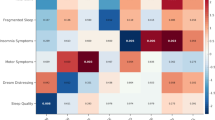Abstract
Sleep disorders are very common in advanced Parkinson’s disease (PD) and have a significant negative impact on the quality of life of patients. Questionnaire-based studies suggest that sleep quality might improve following levodopa–carbidopa intestinal gel (LCIG) infusion. The objective of this study was to evaluate the impact of LCIG infusion and subsequent oral medication changes on polysomnography (PSG) and sleep symptoms in advanced PD patients. Eleven PD patients underwent PSG at baseline and after 3.8 ± 1.2 months of LCIG treatment. LCIG infusion therapy was halted during PSG. Patients were assessed with the Unified-PD-rating-Scale and completed the PD-Sleep-Scale-version-2 (PDSS-2), the Epworth Sleepiness Scale and the RBD single question. Subjective sleep quality improved in all patients. PSG showed a reduction of the number of awakenings in sleep, a trend towards a lower apnea–hypopnea index and no change in sleep latency, total sleep time and sleep efficiency. There was a positive correlation between the number of awakenings and PDSS-2 scores for “difficulty staying asleep”, “muscle cramps of arms or legs” and “urge to move arms or legs”. Motor complications and activities of daily living improved with LCIG. Subjective sleep quality improved significantly and the PSG study showed a less fragmented sleep pattern in advanced PD patients treated with LCIG infusion.

Similar content being viewed by others
References
Ondo WG (2014) Sleep/wake problems in Parkinson’s disease: pathophysiology and clinicopathologic correlations. J Neural Transm 121(Suppl 1):S3–S13
Chahine LM, Amara AW, Videnovic A (2016) A systematic review of the literature on disorders of sleep and wakefulness in Parkinson’s disease from 2005 to 2015. Sleep Med Rev pii:S1087-0792(16)30075-2.
Yong MH, Fook-Chong S, Pavanni R, Lim LL, Tan EK (2011) Case control polysomnographic studies of sleep disorders in Parkinson’s disease. PLoS One 6:e22511
Stocchi F, Stirpe P (2014) The relevance of dopaminergic level in nocturnal disability in Parkinson’s disease: implications of continuous dopaminergic stimulation at night to treat the symptoms. J Neural Transm 121(Suppl 1):S79–S83
Abbott SM, Videnovic A (2016) Chronic sleep disturbance and neural injury: links to neurodegenerative disease. Nat Sci Sleep 25(8):55–61
Olanow CW, Kieburtz K, Odin P et al (2014) Continuous intrajejunal infusion of levodopa–carbidopa intestinal gel for patients with advanced Parkinson’s disease: a randomised, controlled, double-blind, double-dummy study. Lancet Neurol 13:141–149
Honig H, Antonini A, Martinez-Martin P, Forgacs I et al (2009) Intrajejunal levodopa infusion in Parkinson’s disease: a pilot multicenter study of effects on nonmotor symptoms and quality of life. Mov Disord 24:1468–1474
Zibetti M, Rizzone M, Merola A et al (2013) Sleep improvement with levodopa/carbidopa intestinal gel infusion in Parkinson disease. Acta Neurol Scand 127:28–32
Zibetti M, Merola A, Ricchi V et al (2013) Long-term duodenal levodopa infusion in Parkinson’s disease: a 3-year motor and cognitive follow-up study. J Neurol 260:105–114
Tomlinson CL, Stowe R, Patel S et al (2010) Systematic review of levodopa dose equivalency reporting in Parkinson’s disease. Mov Disord 25:2649–2653
Trenkwalder C, Kohnen R, Högl B et al (2011) Parkinson’s disease sleep scale-validation of the revised version PDSS-2. Mov Disord 26:644–652
Johns M (1991) A new method for measuring daytime sleepiness: the Epworth Sleepiness Scale. Sleep 14:540–545
Postuma RB, Arnulf I, Hogl B et al (2012) A single-question screen for rapid eye movement sleep behaviour disorder: a multicenter validation study. Mov Disord 27:913–916
Berry RB, Brooks R, Gamaldo CE, Harding SM, Lloyd RM, Marcus CL, Vaughn BV for the American Academy of Sleep Medicine (2015) The AASM manual for the scoring of sleep and associated events: rules, terminology and technical specifications, Version 2.2. American Academy of Sleep Medicine, Darien, Illinois. https://www.aasmnet.org
Sixel-Döring F, Trautmann E, Mollenhauer B, Trenkwalder C (2012) Age, drugs, or disease: what alters the macrostructure of sleep in Parkinson’s disease? Sleep Med 13:1178–1183
Trenkwalder C, Kies B, Rudzinska M et al (2011) Rotigotine effects on early morning motor function and sleep in Parkinson’s disease: a double-blind, randomized, placebo-controlled study (RECOVER). Mov Disord 26:90–99
Pierantozzi M, Placidi F, Liguori C et al (2016) Rotigotine may improve sleep architecture in Parkinson’s disease: a double-blind, randomized, placebo-controlled polysomnographic study. Sleep Med 21:140–144
Sommerauer M, Werth E, Poryazova R et al (2015) Bound to supine sleep: Parkinson’s disease and the impact of nocturnal immobility. Parkinsonism Relat Disord 21:1269–1272
Author information
Authors and Affiliations
Corresponding author
Ethics declarations
Ethical standards
This study was approved by the Institution Ethics Committee and has, therefore, been performed in accordance with the ethical standards laid down in the 1964 Declaration of Helsinki and its later amendments. All participants gave their informed consent prior to their inclusion in the study. There are no details in this manuscript that might disclose the identity of the participants.
Conflicts of interest
On behalf of all authors, the corresponding author states that there is no conflict of interest.
Rights and permissions
About this article
Cite this article
Zibetti, M., Romagnolo, A., Merola, A. et al. A polysomnographic study in parkinsonian patients treated with intestinal levodopa infusion. J Neurol 264, 1085–1090 (2017). https://doi.org/10.1007/s00415-017-8491-2
Received:
Revised:
Accepted:
Published:
Issue Date:
DOI: https://doi.org/10.1007/s00415-017-8491-2



